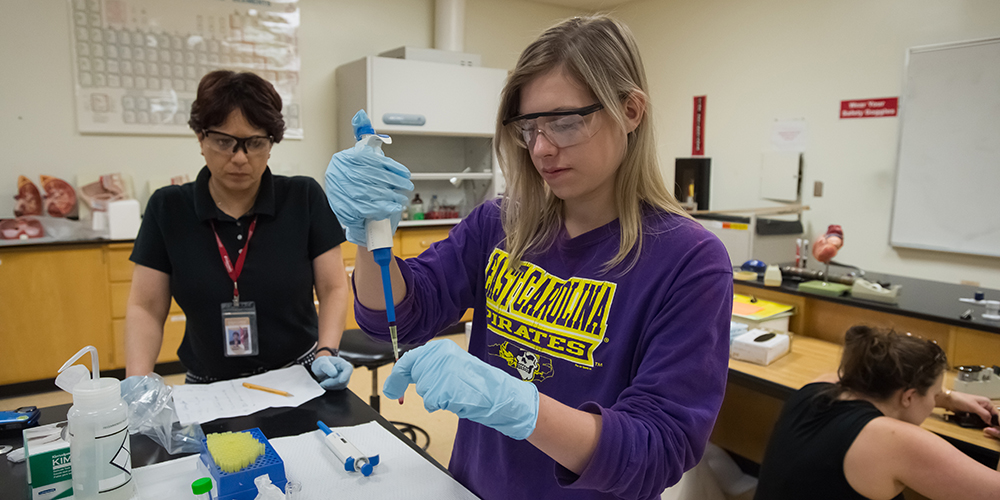Students Preparing for High Altitude Balloon Launch on Saturday

Jilianne Leary, an Edgecombe Early College High School student who is taking classes at Edgecombe Community College, prepares the antifreeze protein experiment that will be aboard the high altitude balloon. Shown with her is Dr. Alma Bracete, ECC chemistry instructor. The balloon launch, which is part of a NASA/NC Space Grant challenge, is set for Saturday morning in Hickory, NC.
A team of 13 instructors and students from Edgecombe Community College will travel to Hickory tomorrow to launch an unmanned high altitude balloon as part of a statewide competition.
A project of the college’s science, technology, engineering, and math (STEM) programs, the high altitude balloon launch is bringing students from engineering, computer science, and other disciplines together to apply what they’ve learned in the classroom to a real-word project.
The college is one of six community colleges in North Carolina competing in the balloon challenge, which is funded through a NASA and NC Space Grant. ECC’s team is dubbed “critECCly stable.”
The group will travel to Catawba Valley Community College in Hickory Friday and will launch the balloon Saturday morning. Team members will then track its course across the state.
Rebecca Stamilio-Ehret, physics/astronomy instructor and project coordinator, began assembling a team of students early this semester.
Students on the team are Kaitlyn Tripp, a student at SouthWest High School who is enrolled in electronics classes at ECC; Edgecombe Early College High School students Jilianne Leary, Isaac Carlos, and Emilee Moore, who are all taking STEM classes at the college; and ECC students Ruben Gaytan-Ledezma, Carlton Morris, and Cristal Carlos.
Faculty advisors are Stamilio-Ehret, Tim Boyd, Trey Cherry, Doug Parrish, Alma Bracete, and Emily Boyd, an adjunct instructor.
Students have been working on the balloon’s payload for weeks. Included is required equipment that collects data such as compass readings, temperature, altitude, and barometric pressure.
Each school chooses equipment for an optional secondary payload. ECC’s second payload is international. It will include antifreeze proteins developed in Professor Matthew Gibson’s lab at the University of Warwick in Coventry, UK.
Dr. Gibson is a leading authority on antifreeze proteins. One of ECC’s student team members contacted him with a question about the proteins, and he responded enthusiastically and offered to provide the antifreeze proteins to go up in the balloon.
The antifreeze proteins will be mixed with two separate solutions, one with blood and one with plant algae, to determine if they will survive the cold temperatures of near space.
In addition to the antifreeze protein solutions and data sensor equipment, Edgecombe Community College’s balloon payload will include a Samsung Galaxy J3 cell phone provided by Comtech Wireless in Tarboro. The company is providing 30 days of data, and the team will use the phone’s location signal as a retrieval option for the payload.
The payload also will include an exterior Canon camera to take a photo every minute, and a GoPro camera for shooting video.
“Students enjoy the challenge of this type of real-world project,” says Stamilio-Ehret. “They get very involved and have to combine lots of skill sets, like math, science, technical, and problem-solving skills.”
Student Jilianne Leary agrees, “This project is like a bunch of classes rolled into one.”
The launch of the team’s high altitude balloon will be on Facebook Live Saturday morning. Check the college’s Facebook page Friday night for an update on the exact time of the launch.
